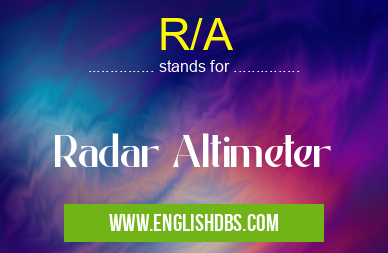What does R/A mean in NASA
A Radar Altimeter, often abbreviated R/A, is a device used to measure the altitude of an aircraft or spacecraft above ground level. It works by sending out radio waves that are reflected off the ground and then measuring the time it takes for them to return. This process is known as radar altimetry. With R/A technology, pilots can accurately measure their elevation relative to the terrain below, making it an essential tool for safety in aviation.

R/A meaning in NASA in Governmental
R/A mostly used in an acronym NASA in Category Governmental that means Radar Altimeter
Shorthand: R/A,
Full Form: Radar Altimeter
For more information of "Radar Altimeter", see the section below.
» Governmental » NASA
Working Principle
The working principle of a R/A unit is relatively simple; it consists of an antenna which transmits a signal towards the ground and receives back echoes that reflect off the surface of the terrain below. The time interval between transmission and reception varies depending on how far away the terrain is - thus allowing altitude measurements to be made relative to this distance. The R/A unit also contains an internal processor which uses this data to calculate accurate elevation readings. This information can then be used by pilots to make informed decisions regarding their flight path and airspeed.
Benefits
R/As provide many advantages over traditional methods of measuring altitude, such as barometric pressure systems or visual estimation techniques. First, they allow for rapid updates on altitude readings as well as real-time accuracy — something which cannot be achieved with human judgement alone. Furthermore, they enable pilots to maintain safe distances from terrain even in low visibility conditions such as fog or clouds - thereby reducing risk during flights over difficult terrain or at night. Finally, Radar Altimeters are highly cost-effective and can be easily integrated into existing avionics systems with minimal modifications required.
Essential Questions and Answers on Radar Altimeter in "GOVERNMENTAL»NASA"
What is a Radar Altimeter?
A radar altimeter is an instrument used to measure the height of an object relative to the ground. It uses radio waves from an antenna to measure how long it takes for a signal to return if reflected off the ground. This time measurement can be used to determine the altitude or elevation of the object.
How Does a Radar Altimeter Work?
Radar altimeters use electromagnetic waves to measure distance from an antenna in the sky and bounces back energy off the surface below. The speed of light is constant, so by measuring how long it takes these signals to travel back and forth, distance can be accurately calculated. This stored data can help determine altitude or elevation of a given location.
What Are Typical Applications for Radar Altimeters?
Common applications for radar altimeters include aircraft navigation, oil and mineral exploration, terrain mapping, military operations and more. Radar altimeters are often used when operating in unknown terrain, particularly areas with rough or mountainous terrains that cannot be accurately surveyed using traditional methods.
What Types of Radar Altimeters Are Available?
There are two main types of radar altimeters available on the market today; airborne radar systems and ground-based systems. Airborne systems use high-frequency radio waves transmitted from a platform such as an airplane or helicopter, while ground-based devices are typically located near points where data needs to be collected.
Is a Radar Altimeter Accurate?
Yes, radar altimeters provide highly accurate measurements when operated correctly -- typically within half an inch tolerances depending on conditions like atmospheric pressure, turbulence and other variables affecting signal propagation. They are also unaffected by dust or other particles in the atmosphere which makes them ideal for outdoor use in most conditions.
Does a Radar Altimeter Require Maintenance?
While radar altimeters will not require any major maintenance work over their lifetime, regular checks should be carried out to ensure optimal performance. This includes checking parts for wear and tear as well as making sure all electronics are functioning properly according to manufacturer instructions. These checks should take place twice year at least as per standard industry guidelines.
Can I Use a Radar Altimeter at Night?
Yes! The majority of radar altimeters have been designed with night time operation capabilities in mind — they feature robust low-light sensors which allow them to collect data even under moonless nights without any problems whatsoever!
How Much Will Investing in a Radar Altimeter Cost Me?
Certain factors will affect the cost of investing in either an airborne or ground based system - this includes unit type, usage requirements (requiring multiple antennas etc.) and any additional features you may wish such as GPS systems compatibility etc., but prices start around $500 USD depending on model type chosen therefore making them reasonably affordable for many commercial operations or government organisations alike!
How Long Do Most Standard Models Retain Their Data Storage Capacity For?
Many modern models contain internal memory chips capable of storing data up-to 8 hours' worth of data collection before needing emptied and re-used again — however usage also depends on how much data is being recorded during each given period as this too will factor into overall storage capacity longevity.
Final Words:
With its ability to increase flight safety and reduce pilot workloads, Radar Altimeters have become a standard tool in modern aviation operations worldwide. Not only do they allow aircrafts more precise navigation capabilities but they also offer up-to-date elevation readings — essential when flying in regions with changing topography or difficult weather conditions. As a result, R/As have made air travel safer and more efficient than ever before — truly revolutionizing air navigation today.
